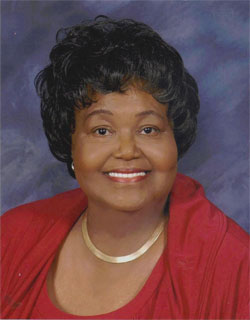
Dorothy Pearson was on campus in April to hear Rabbi Morris Allen deliver the inaugural Dorothy Pearson Lecture in Equity and Social Justice.
After growing up in the heat of Mississippi and Louisiana, Dorothy Pearson (’60 MSSW L&S, ’73 PhD L&S) felt the cool breeze off Lake Michigan in June and sensed it was the wind of change.
The year was 1958, and Pearson had just graduated from Southern University. She was on vacation in Milwaukee visiting a brother who had moved North in search of a better life.
“I was already admitted to graduate school at Atlanta University and at Fisk University,” she said. “Over the summer, I would decide which way I should go. I was very tired because I had finished college in three calendar years.”
And then she experienced that lake air. “I don’t know if you can imagine what the weather was in Louisiana when I left in June: Hot, humid, muggy, damp, no relief at night. This was so different,” she said. “Then I looked around. I saw different people. I was born and reared in the legally segregated South. It became interesting to me to see what was going on in this part of the world. … So I thought, ‘Maybe there’s a school of social work here.’ “
Although admissions were closed at what was then a satellite Milwaukee campus for the UW-Madison School of Social Work, Pearson did what she often has when faced with an obstacle in life. She worked around it.
“I asked them to look at my application, all of my references were there, and I’d already been admitted to two schools. It must have been enough to get an interview with professors John Teter and Max Kurz,” she said. “I was pretty naïve, which worked in my favor. I didn’t know you weren’t supposed to do that.”
Pearson went on to earn her master’s degree, work in Milwaukee social services, become the first African-American to earn a PhD in the UW-Madison School of Social Work in 1973 and establish the doctoral program in social work at Howard University.
She was back on campus in mid-April to witness School of Social Work alumnus Rabbi Morris Allen (BA ’76, MSSW ’77) deliver the inaugural Dorothy Pearson Lecture in Equity and Social Justice. Allen spoke on “Food, Religion and Workers’ Rights,” specifically his campaign on behalf of workers, many of them Latino immigrants, laboring in the kosher food industry.
Allen’s lecture confirmed her decision to fund the series, Pearson said. “I never would have thought about a rabbi giving the inaugural lecture. When I heard him, I said, ‘This is what I’m talking about.’ I learned so much from what he’s doing. I thought it was great, and he’s such a delightful person and a person of passion.”
Passion has been a constant throughout Pearson’s life. “I’m used to challenges,” she said. “It’s because of being raised in the South with segregation. You were barred from white institutions based on color. I wondered, ‘What do they have over there that they do not want us to know?’ Or, ‘Maybe I’m not as good as I think I am.’ There’s another world out there; maybe I’d better go see.”
After she started her coursework in Wisconsin, Pearson discovered that she more than belonged. “I couldn’t understand what the big secret was,” she said. “When I got there and saw my fellow students, I saw that they were ordinary people. I said, ‘What is all of this stuff about?’ ”
She called her arrival in Wisconsin “a happy landing.” “I was very well-accepted,” she said. “My little apartment became the study place.”
When she came to Madison at the turn of the ‘70s for the PhD program, she was elated. “I was thrilled to work with the famous professors: Alfred Kadushin, Martin Loeb, E.E. LeMasters, Vivian Wood and Irving Pillavin. It was very exciting. I had my degree in three years.”
Once she earned her doctorate, Pearson taught at the University of Miami School of Medicine and Barry University School of Social Work in a joint appointment. She was tasked with planning a faculty retreat and asked the dean of the Howard University School of Social Work to be a co-facilitator. “In that process, he said to me, ‘You have to come home,’ if you know what that means,” she said.
She joined the Howard faculty and quickly established the doctoral program in its School of Social Work.
At UW-Madison, Pearson has made gifts to fund the lecture series and has included a bequest in her will to provide fellowships for African-American graduate students.
“After retiring in 1999, I was thinking back over my life and at what point in my life where I contributed or where people may have contributed to me,” she said. “In those developing years, it was UW that allowed me to move into the higher education area, develop a point of view and encounter all the wonderful people who I learned from. The idea of giving back became the prominent road that I wanted to travel, rather than just receiving for what I had done.
“When I was young, somebody took my calls here, gave me an interview, gave me support,” she said. “I thought, ‘Maybe I could be that for some other little girl coming up who is trying to break into that other world that has been held back from her.’ ”
